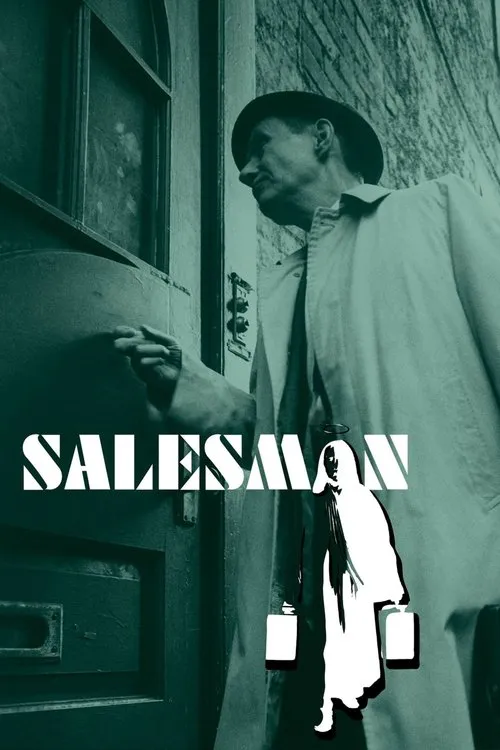Salesman

Plot
The Salesman, a 1969 documentary film directed by Albert and David Maysles, offers a candid and unflinching portrayal of four door-to-door salesmen working for the Mid-American Bible Company. These men, driven by a mix of desperation and determination, navigate the challenging landscape of small-town America, armed with little more than their charisma and the allure of gold-leaf Bibles. At the heart of the documentary are four distinct personalities: Paul "The Badger" Brennan, Charles "The Gipper" McDevitt, James "The Rabbit" Baker, and Raymond "The Bull" Martos. These salesmen, each with their own unique approach and temperament, are thrown into a world of rejection and disappointment, as they struggle to make a living from selling a product that increasingly seems like an anachronism in the eyes of the suburban communities they visit. As the documentary opens, we find ourselves immersed in the cramped, dingy hotel rooms where the salesmen spend their evenings, sharing what little food and drink they can afford. Their daily routine consists of driving through the countryside, trudging from door to door, where they engage in an often tense and sometimes comical struggle to persuade hesitant and apathetic homeowners to purchase a gold-leaf Bible. The salesmen themselves are an interesting study. Paul Brennan, "The Badger," is a grizzled veteran of the sales circuit, his weathered face and imposing physique commanding respect if not always admiration. He's a hard-nosed businessman who will stop at nothing to make a sale, often using high-pressure tactics to wear down his targets. Brennan is the self-proclaimed "king of the circuit," a proud and unyielding figure who sees himself as a master of the art of sales. In contrast, Charles McDevitt, "The Gipper," is a more affable and garrulous presence, often using his charm and good humor to win over even the most skeptical of customers. He's an affable Irishman with a silver tongue and a gift for storytelling, but beneath his affable exterior lies a calculating sales machine just as ruthless as Brennan in his pursuit of a profit. James Baker, "The Rabbit," on the other hand, is a quiet and unassuming presence, his reserved nature making him an enigma to his colleagues and even himself. He's a struggling newcomer to the sales circuit, still grappling with the brutal realities of his job and the constant disappointment that comes with a life spent in failure. Finally, there is Raymond Martos, "The Bull," the oldest and most veteran member of the sales quartet. Martos is a gruff, grizzled salesman who has seen better days, his once-sharp wit and salesman's charm now dulled by years of struggle and disillusionment. His story serves as a sad reminder of the perils and costs of a life spent peddling dubious merchandise to gullible customers. Throughout the documentary, the Maysles brothers skillfully weave together these individual narratives, using the salesmen's daily struggles and setbacks as a catalyst for a wider discussion about the American Dream. These men are caught in a never-ending cycle of hustle and desperation, forever chasing the elusive prospect of success in a world that seems to value quantity over quality and profit over people. The film's use of location shooting and candid interviews allows us to witness firsthand the often-repulsive tactics used by the salesmen to make a sale. From the high-pressure sales pitches to the outlandish lies and exaggerations used to persuade hesitant customers, the documentary offers a disturbing portrait of a world where the ends justify the means and the customer is always seen as a means to an end. As the documentary wears on, we begin to see the toll that this grueling existence takes on the salesmen themselves. Their hotel room nights are filled with cheap food, stale cigarettes, and broken dreams, a bleak testament to the hardships of a life spent in constant uncertainty. Their relationships with each other are complicated and troubled, their mutual distrust and disrespect for one another a stark reflection of the harsh realities of a world without empathy or compassion. Despite the bleakness of their existence, the salesmen are drawn to their work with an almost primal intensity, driven by a fundamental need for recognition and validation. In the eyes of their customers, they see themselves reflected as failures, outcasts, and misfits. But for these four men, the sales pitch is more than just a transaction - it's a desperate cry for connection, a fleeting attempt to transcend their own inadequacies and connect with a world that seems increasingly hostile to their existence. In the end, The Salesman is a haunting and thought-provoking documentary that sheds new light on the often-overlooked world of door-to-door salesmen. While some have criticized the film for its perceived pessimism and lack of empathy for its subjects, it can be argued that the Maysles brothers' documentary serves as a necessary critique of a society that values profit over people and convenience over compassion. The Salesman's enduring power lies in its ability to humanize these four disaffected individuals, exposing the raw nerves and vulnerabilities that lie beneath the surface of their hard-boiled, world-weary exteriors.
Reviews
Recommendations




